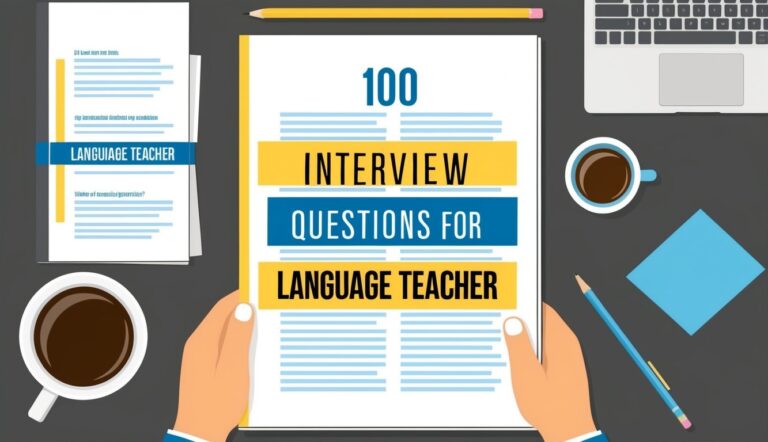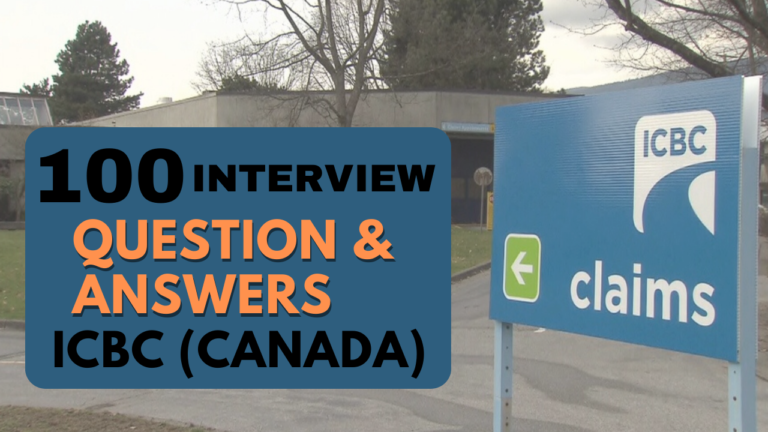50 Essential Questions for Teaching Job Candidates: Mastering the Interview

Securing a teaching position is a significant milestone in an educator’s career, and the interview process plays a pivotal role in determining the right fit for both the candidate and the educational institution.
Aspiring teachers often face a rigorous selection process that involves demonstrating their expertise, passion for education, and ability to inspire and engage students. This post covers Top 50 essential questions for teaching job candidates.
The interview serves as a platform for candidates to showcase their teaching philosophy, classroom management skills, and commitment to fostering a positive learning environment.

In today’s competitive educational landscape, prospective teachers must be well-prepared to address a wide range of questions that assess their instructional capabilities, adaptability, and understanding of educational best practices.
In this article, we will explore a comprehensive ‘list of 50 top questions commonly asked during teaching job interviews’. By providing insights and guidance on effectively responding to these questions, this resource aims to empower educators with the tools they need to showcase their expertise and passion, ultimately increasing their chances of securing their desired teaching position.”
List of Top 50 Interview Questions for Teaching Job
- How would you describe your teaching philosophy?
- What inspired you to become a teacher?
- How do you tailor your teaching methods to meet the needs of diverse learners?
- Can you describe a lesson that didn’t go as planned and how you handled it?
- How do you incorporate technology into your teaching?
- What strategies do you use to motivate students who are reluctant learners?
- How do you measure student success beyond academic grades?
- What is your approach to homework and assignments?
- How do you stay updated with the latest educational research and teaching methods?
- Describe your classroom management strategy.
- How do you handle discipline in your classroom?
- Can you give an example of a challenging behavior you’ve encountered and how you addressed it?
- How do you create a safe and inclusive classroom environment?
- What are your strategies for managing large classes?
- How do you encourage positive behavior and engagement in your classroom?
- How do you align your lessons with state standards and curriculum requirements?
- Describe your process for planning a unit.
- How do you differentiate instruction to cater to all learning styles?
- Can you explain how you assess student learning during and after a lesson?
- How do you incorporate critical thinking skills into your lessons?
- Describe how you would integrate cross-curricular connections in your teaching.
- How do you engage students in the learning process?
- Describe a particularly effective lesson you have taught and why it was successful.
- How do you support students with special educational needs in your classroom?
- What methods do you use to build a strong teacher-student relationship?
- How do you encourage creativity in your students?
- How do you provide feedback to students and parents?
- How do you work with colleagues to improve the school’s learning environment?
- Can you share an experience where you collaborated on a project or initiative with your peers?
- How do you incorporate feedback from colleagues and administrators into your teaching?
- Describe your involvement in extracurricular activities.
- How do you pursue professional development opportunities?
- How do you communicate student progress to parents?
- Describe a difficult conversation you’ve had with a parent and how you handled it.
- How do you involve parents in their children’s education?
- What role do you believe the community should play in a child’s education?
- What do you think are the key qualities of an effective teacher?
- How do you encourage creativity in your students?
- How do you handle teaching topics that are sensitive or controversial?
- How do you promote critical thinking in your classroom?
- Describe how you have used data to inform your teaching practices.
- What experience do you have with students from diverse cultural and socioeconomic backgrounds?
- How do you facilitate group work and collaboration among students?
- What strategies do you use to engage parents in their child’s education?
- Describe a lesson that didn’t go as planned and how you responded.
- How do you ensure your teaching meets all students’ academic needs?
- How do you use technology to collaborate with colleagues and improve your teaching practice?
- What strategies do you employ to help students prepare for standardized tests?
- How do you encourage students to take ownership of their learning?
- How do you balance the demands of teaching with continuing your own education and professional development?
10 Background Questions for Teaching Job
- Can you tell us about your educational background and teaching credentials?
- What inspired you to become a teacher?
- How long have you been teaching, and what grades or subjects have you taught?
- Can you describe your teaching philosophy?
- What achievements in your teaching career are you most proud of?
- How do you stay current with educational research and teaching methods?
- What experience do you have with technology in the classroom?
- How do you approach classroom management and discipline?
- Can you share an example of how you’ve worked to engage parents in their child’s education?
- Why are you interested in working at our school?
10 Leadership Questions for Teaching Job
- How do you demonstrate leadership in the classroom?
- Can you give an example of a leadership role you’ve taken on outside of classroom teaching?
- How do you inspire and motivate students to take on leadership roles themselves?
- Describe a time when you had to lead a team of colleagues. What was the outcome?
- How do you handle resistance or lack of cooperation from students or colleagues?
- What strategies do you use to foster a collaborative environment in your classroom?
- How do you incorporate student leadership opportunities into your curriculum?
- Describe how you have contributed to the development of school policies or initiatives.
- How do you mentor or support new teachers or staff members?
- What do you believe are the most important qualities of a leader in education?
10 Experience based Questions for Teaching Job
- Can you describe a particularly successful lesson you planned and executed? What made it successful?
- Share an experience where you had to adapt your teaching approach to meet the needs of a diverse classroom.
- Describe a challenging situation with a student or class you faced and how you resolved it.
- Have you ever initiated a new program or project at your school? What was it and what was the outcome?
- Can you provide an example of how you’ve integrated technology into your teaching?
- Describe a time when you had to manage a conflict between students. How did you handle it?
- How have you used assessment data to inform your teaching practices?
- Share an experience where you collaborated with colleagues to improve student outcomes.
- Describe a time when you received feedback on your teaching. How did you respond and what did you learn?
- Can you give an example of how you have contributed to the school community outside of your regular teaching duties?
Top 20 Tips for a successful teacher (Teaching Job Interview Tips)
- Research the School: Understand the school’s mission, values, curriculum, and any special programs they offer. This will help you tailor your responses to align with their goals.
- Prepare Your Portfolio: Have a well-organized portfolio ready, including lesson plans, letters of recommendation, certifications, and examples of student work.
- Know Your Philosophy: Be able to articulate your teaching philosophy clearly and concisely, highlighting how it influences your teaching style and classroom management.
- Showcase Your Skills: Be prepared to discuss specific skills, such as classroom management techniques, differentiation strategies, and how you integrate technology into your lessons.
- Use Examples: Provide concrete examples from your teaching experience to illustrate your points, such as successful projects or challenging situations you’ve navigated.
- Understand Current Trends: Show that you’re up-to-date with educational trends and how they impact your teaching, such as blended learning, project-based learning, or social-emotional learning.
- Demonstrate Flexibility: Share examples of how you’ve adapted lessons or strategies to meet diverse student needs, emphasizing your flexibility and adaptability.
- Be Student-Centric: Highlight your commitment to student success, showing how you engage students and foster a positive learning environment.
- Prepare Questions: Have thoughtful questions ready to ask about the school, its culture, and expectations for teachers. This shows your interest and enthusiasm for the position.
- Reflect on Challenges: Be ready to discuss challenges you’ve faced in your teaching career and how you overcame them, demonstrating resilience and problem-solving skills.
- Discuss Assessment Strategies: Explain how you assess student learning and use assessment data to guide instruction, ensuring you can meet diverse learning objectives.
- Show Enthusiasm: Convey your passion for teaching and enthusiasm for the opportunity to join the school community.
- Communicate Clearly: Practice clear and concise communication, ensuring you can articulate your thoughts effectively during the interview.
- Show Professionalism: Dress professionally and arrive early to the interview, showing that you are serious and professional about the opportunity.
- Engage in Continuous Learning: Discuss your commitment to professional development and how you stay informed about best practices in education.
- Build Rapport: Try to build rapport with your interviewers. Being personable and relatable can help make a memorable impression.
- Discuss Collaboration: Share how you’ve worked collaboratively with colleagues, parents, and the community to enhance student learning.
- Mention Extracurricular Involvement: If applicable, talk about your willingness to participate in or lead extracurricular activities, as this can be an important part of school life.
- Follow Up: Send a thank-you email after the interview, expressing your appreciation for the opportunity to interview and reiterating your interest in the position.
- Reflect and Learn: After the interview, take time to reflect on what went well and what could be improved for future interviews, allowing for personal growth and preparedness.
Conclusion
Interviewing for a teaching job is a critical step in the journey of becoming an educator. It’s not just about showcasing your qualifications and experience; it’s also about demonstrating your passion for teaching, your commitment to student success, and your ability to contribute positively to the school community.
The questions asked during the interview are designed to explore various facets of your teaching philosophy, classroom management skills, instructional strategies, and your interpersonal skills with students, parents, and colleagues.
To succeed in a teaching job interview, it’s essential to come prepared with examples from your teaching experience that highlight your strengths and how you’ve overcome challenges.
Reflecting on your practice and being able to articulate your educational philosophy are key. Understanding the school’s culture and aligning your responses to their values and goals can significantly impact the interview’s outcome.
Finally, remember that the interview is a two-way process. It’s not only about the school finding the right candidate but also about you finding a school where you can thrive and make a difference. This article includes the most crucial 50 questions for candidates applying for teaching positions.
Asking insightful questions and showing enthusiasm for the position can leave a lasting positive impression. With thorough preparation and a reflective approach, candidates can navigate the interview process successfully, opening the door to rewarding teaching opportunities.






